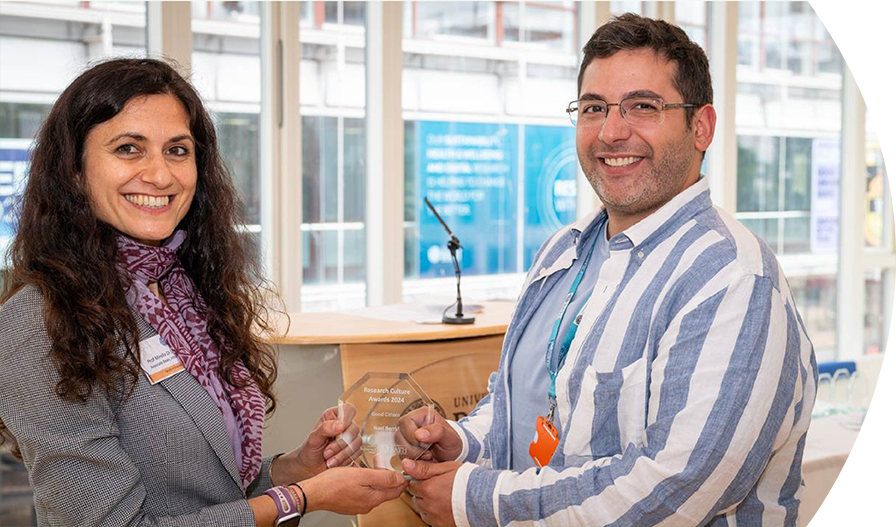The Faculty of Medical Sciences was established under Decree No. 1118 dated 12 October 1983, and it plays a leading role in education, research and development in various fields of medical care in cooperation with local and external academic and health institutions.
Since its establishment, the Faculty of Medical Sciences paved the way for outstanding young men and women in Lebanon to achieve their ambitions to study medicine, and graduated the best physicians who enjoy high scientific competence, integrated training and high professional ethics.
The Faculty of Medical Sciences seeks to obtain full and comprehensive international accreditation at the level of patient care, medical education and research. It also works to maintain the confidence of the Lebanese public through the quality of its clinical, educational and research programs and encouraging innovation to serve all of these national and international health care needs and the principles of social justice.
The Neuroscience Research Center (NRC) is affiliated to the faculty and aims to enhance the educational attainment of students in neuroscience specializations, in line with the needs of the university and public and private hospitals.
Several applied and research laboratories are also affiliated to the faculty, including: Biology Laboratory, Histology Laboratory, Immunology Laboratory, Chemistry Laboratory, Bacteriology Laboratory, Molecular Biology Laboratory, Physiology Laboratory, ENT Laboratory, Laparoscopy Laboratory, Gynecology Simulator Laboratory, Cardiology Simulator Laboratory
Mission, Vision, Values, and Goals
Mission
The Faculty of Medical Sciences at the Lebanese University (FMS-LU) is a public academic institution committed to the development of socially accountable, scientifically competent, and ethically grounded physicians and health professionals. Through an integrative model that unites education, research, and community-oriented service, FMS-LU seeks to improve health outcomes and promote equity within Lebanon and the broader region.
The faculty nurtures a culture of excellence grounded in quality assurance, continuous improvement, and evidence-based practice, enabling graduates to excel in a dynamic global healthcare landscape. Recognizing its unique mandate as a public institution, FMS-LU explicitly aligns its mission with national health priorities and actively engages diverse stakeholders—including students, faculty, healthcare institutions, policymakers, and communities—in shaping its academic and social agenda.
Furthermore, FMS-LU integrates proactive risk management and strategic foresight to strengthen institutional resilience, ensuring sustainability in an increasingly complex and uncertain healthcare environment. By fostering collaboration, innovation, and inclusivity, the faculty aspires to produce professionals who are not only leaders in clinical competence and medical research but also agents of transformative change committed to serving the public good.
Vision
FMS-LU envisions becoming a leading academic medical institution, nationally and internationally recognized for excellence in medical education, research, and patient-centered care, and distinguished by its unwavering commitment to social accountability. The faculty strives to be a trusted partner of the Lebanese public healthcare system, proactively addressing the evolving health needs of all communities across socio-demographic, geographic, and cultural lines.
Through meaningful integration of educational innovation, scientific inquiry, and community engagement, FMS-LU seeks to contribute to the realization of equitable, inclusive, and sustainable healthcare systems. The faculty is determined to advance academic leadership by embedding robust quality assurance mechanisms, interdisciplinary collaboration, and adaptive risk management frameworks into all institutional functions. Ultimately, FMS-LU aims to serve as a model for responsive, ethical, and impactful medical education in Lebanon and the region.
Core Values
1. Excellence in Medical and Biomedical Education – Commitment to high standards in teaching, learning, and student development.
2. Clinical Competence and Compassionate Care – Promotion of patient-centered care delivered with professionalism and empathy.
3. Scientific Research and Innovation – Advancement of knowledge through rigorous, interdisciplinary, and ethically conducted research.
4. Social Accountability – Responsiveness to the health needs of society through partnerships, service, and policy engagement.
5. Integrity and Professional Ethics – Adherence to the highest moral and professional standards in all academic and clinical activities.
6. Equity, Diversity, and Inclusion – Respect for diverse perspectives, cultures, and backgrounds, fostering inclusive environments.
7. Quality Assurance – Systematic monitoring and evaluation to ensure continuous improvement across all institutional dimensions.
8. Risk Management and Resilience – Anticipation and mitigation of internal and external risks to ensure long-term institutional stability.
9. Health Promotion and Public Engagement – Empowerment of communities through education, advocacy, and preventive care.
10. Lifelong Learning and Faculty Development – Cultivation of a culture that supports continuous personal and professional growth.
The faculty grants the following degrees:
1. Doctor of Medicine
2. PhD in: General Surgery, Orthopedic Surgery, Obstetrics & Gynecology, Urology, Pediatric Surgery or Infantile Surgery, Thoracic and cardiovascular Surgery, Neurosurgery, Plastic and Reconstructive Surgery, Otorhinolaryngology Head and Neck Surgery, Ophthalmology, Anesthesia and Reanimation, Pediatrics, Pathology, Psychiatry, Internal Medicine, Cardiology, Gastroenterology, Radiology, Nephrology, Rheumatology, Neurology, Hematology Oncology, Infectious Diseases, Endocrinology, Pneumology, Dermatology, Laboratory Medicine, Neonatology, Pediatric Hematology Oncology, Emergency Medicine, Geriatrics, Intensive Care Medicine.
3. University Diploma in: Loco Regional Echo Guided Anesthesia, Medical Research, Clinical Research, Laparoscopic Surgery, Body Damage Reparation, Ethics, Basics of Clinical Management of Weapon-Wounded Patients, Hypertension and Cardiovascular Risks, Arthroscopic Surgery, Obstetric & Gynecological Echography.
The Neuroscience Research Center grants the following degrees:
1. Research Master in Neuroscience
2. Research Master in Neuropsychology
3. Research Master in Neuroimaging
